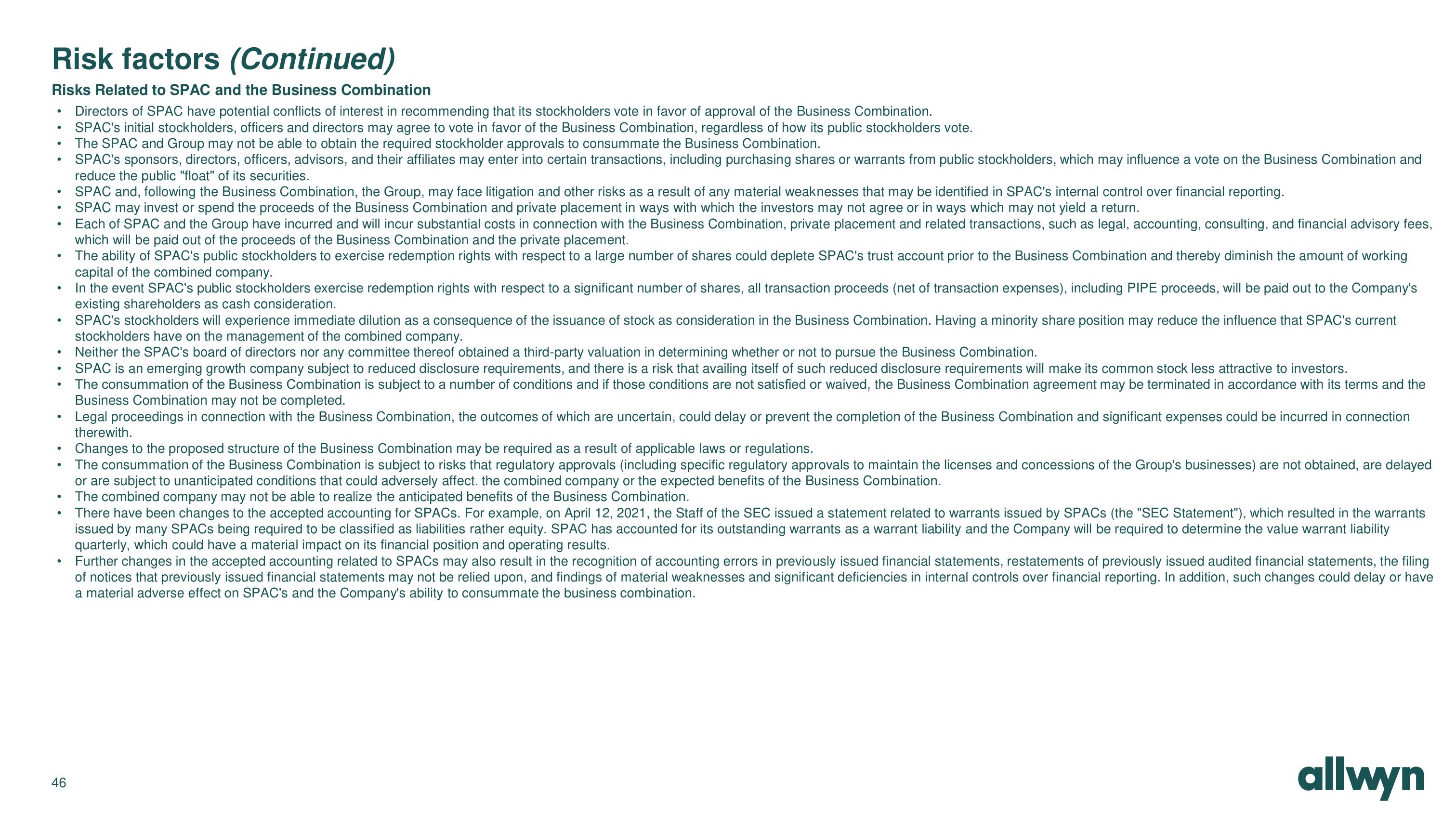Allwyn SPAC
Risk factors (Continued)
Risks Related to SPAC and the Business Combination
Directors of SPAC have potential conflicts of interest in recommending that its stockholders vote in favor of approval of the Business Combination.
SPAC's initial stockholders, officers and directors may agree to vote in favor of the Business Combination, regardless of how its public stockholders vote.
The SPAC and Group may not be able to obtain the required stockholder approvals to consummate the Business Combination.
SPAC's sponsors, directors, officers, advisors, and their affiliates may enter into certain transactions, including purchasing shares or warrants from public stockholders, which may influence a vote on the Business Combination and
reduce the public "float" of its securities.
SPAC and, following the Business Combination, the Group, may face litigation and other risks as a result of any material weaknesses that may be identified in SPAC's internal control over financial reporting.
SPAC may invest or spend the proceeds of the Business Combination and private placement in ways with which the investors may not agree or in ways which may not yield a return.
Each of SPAC and the Group have incurred and will incur substantial costs in connection with the Business Combination, private placement and related transactions, such as legal, accounting, consulting, and financial advisory fees,
which will be paid out of the proceeds of the Business Combination and the private placement.
The ability of SPAC's public stockholders to exercise redemption rights with respect to a large number of shares could deplete SPAC's trust account prior to the Business Combination and thereby diminish the amount of working
capital of the combined company.
In the event SPAC's public stockholders exercise redemption rights with respect to a significant number of shares, all transaction proceeds (net of transaction expenses), including PIPE proceeds, will be paid out to the Company's
existing shareholders as cash consideration.
●
●
●
●
●
●
●
●
●
46
SPAC's stockholders will experience immediate dilution as a consequence of the issuance of stock as consideration in the Business Combination. Having a minority share position may reduce the influence that SPAC's current
stockholders have on the management of the combined company.
Neither the SPAC's board of directors nor any committee thereof obtained a third-party valuation in determining whether or not to pursue the Business Combination.
SPAC is an emerging growth company subject to reduced disclosure requirements, and there is a risk that availing itself of such reduced disclosure requirements will make its common stock less attractive to investors.
The consummation of the Business Combination is subject to a number of conditions and if those conditions are not satisfied or waived, the Business Combination agreement may be terminated in accordance with its terms and the
Business Combination may not be completed.
Legal proceedings in connection with the Business Combination, the outcomes of which are uncertain, could delay or prevent the completion of the Business Combination and significant expenses could be incurred in connection
therewith.
Changes to the proposed structure of the Business Combination may be required as a result of applicable laws or regulations.
The consummation of the Business Combination is subject to risks that regulatory approvals (including specific regulatory approvals to maintain the licenses and concessions of the Group's businesses) are not obtained, are delayed
or are subject to unanticipated conditions that could adversely affect. the combined company or the expected benefits of the Business Combination.
The combined company may not be able to realize the anticipated benefits of the Business Combination.
There have been changes to the accepted accounting for SPACs. For example, on April 12, 2021, the Staff of the SEC issued a statement related to warrants issued by SPACS (the "SEC Statement"), which resulted in the warrants
issued by many SPACs being required to be classified as liabilities rather equity. SPAC has accounted for its outstanding warrants as a warrant liability and the Company will be required to determine the value warrant liability
quarterly, which could have a material impact on its financial position and operating results.
Further changes in the accepted accounting related to SPACs may also result in the recognition of accounting errors in previously issued financial statements, restatements of previously issued audited financial statements, the filing
of notices that previously issued financial statements may not be relied upon, and findings of material weaknesses and significant deficiencies in internal controls over financial reporting. In addition, such changes could delay or have
a material adverse effect on SPAC's and the Company's ability to consummate the business combination.
allwynView entire presentation